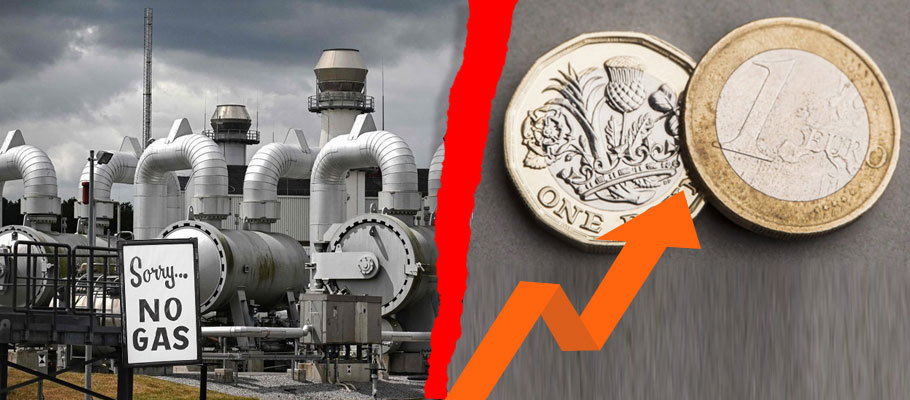
Published: August 24th, 2022
Euro exchange rates are feeling the late Summer heat as gas supplies in the Eurozone face a geo-political squeeze and analysts see minimal prospects for a shirt-term turnaround.
Sterling rallied against the Euro at the start of the week as Eurozone energy prices hit record highs and another shutdown of Russian gas supplies loomed on the horizon.
The benchmark Dutch TTF price for European gas rose to EUR 290 per MWh, pushing electricity supply contracts in France and Germany to new records.
Those moves pulled the Euro-Dollar exchange rate down below the psychologically important 1.0 level, as forex traders quickened their selloff of the single currency on fears of a coming Eurozone recession.
Surging Eurozone electricity prices were aggravated further by nuclear power station outages in France, and the likelihood of more cuts to the supply of Russian gas in response to sanctions.
On Friday 19 August, the Kremlin said that the Nord Stream pipeline that delivers gas to Germany will be shut for repairs on August 31 for three days.
Tristan Schmieding, Chief Economist at Allianz in Frankfurt, told Deutsche Welle the decision is a political one.
‘In what looks like a bid to exploit Europe’s dependence on Russian gas, Russia said that it will close the Nord Stream 1 pipeline for unscheduled 'maintenance' on 31 August’.
The decision to halt supplies is happening in the middle of a gas bidding war as European governments try to fill their gas storage facilities ahead of what looks to be a winter of political discontent.
‘The worry is that the three-day shutdown of Europe’s primary gas pipeline will be drawn out and make the Euro vulnerable to sudden losses over the next few weeks.'
The GBP/EUR rate had risen back to 1.1855 at time of writing, taking bank account transfer rates to around 1.1589 and rates given by independent payment providers to above 1.17.
'Summer's end sees EUR back under pressure, partly because the Greenback is bid and partly because the worries hanging over the European economy aren’t going away anytime soon,’ says Karl Jucken, Head of Forex Strategy at Berenberg Bank.
‘The spike in natural gas prices and a shifting economic outlook are undermining prospects for EUR in forex markets. Both factors could continue to pressurise the Euro lower in the short term.’
Britain is also experiencing higher gas prices, but investors see the Eurozone as being gravely exposed to the long-tail impacts of the Ukraine crisis.
That’s largely down to heavy reliance on gas to power German factories. If higher energy costs slow growth in the Eurozone's industrial heartlands, it could spark a wider slowdown across the region.
While UK gas prices are also influenced by market forces on the continent, there are notable differences. Britain still has its own domestic gas production in the North Sea, as well as terminals configured for offloading and processing of seaborne Liquified Natural Gas (LNG).
Germany, by contrast, has no suitable LNG terminal at its ports and relies heavily on the NS1 pipeline.
The UK's top gas provider is Norway, arguably a more stable supplier than Russia, which has used its heft to put political pressure on Germany and other EU countries in a bid to have sanctions lifted.
For that reason the outlook for EUR remains challenging.
Sterling was up against the Euro for much of June following publication of UK labour market figures that revealed a strong rise in wages and a bigger than expected drop in unemployment.
Figures showed that UK wages rose faster than expected in June, while job vacancies remain high in an environment of low-unemployment.
The UK government’s Office of National Statistics (ONS) said average British earnings were on the rise, with an increase of five per cent in June when bonuses were included. That was above the 4.5 per cent market consensus expected, though less than May's 6.1 per cent rise.
Average earnings excluding bonuses rose by 4.6 per cent, above market expectations of 4.5 per cent and bettering the 4.3 per cent growth posted in May.
While earnings are still well below inflation, Britain’s central bankers are expected to keep raising interest rates, since wage settlements are currently elevated relative to longer-term trends.
An analyst note from HSBC said that the figures ‘confirm our view that the Bank of England (BoE) will need to raise interest rates beyond the three per cent most analysts are expecting.
It was the second consecutive print indicating healthy economic growth. In May, the ONS said the UK had added more than 81,000 jobs in the three months to March 2022, well in excess of what the market was looking for.
The rate of unemployment also made a surprise drop to 3.7 per cent from 3.9 per cent, the lowest level seen in five decades.
'Even with the slowdown in growth seen in March, the UK labour market is simmering with record openings and lateral employment moves,’ said Barclay’s Bank in an analyst note.
Average wages, including bonuses, rose by seven per cent, much more than the 5.5 per cent markets were expecting.
The overall outlook was bullish for the Pound, sustaining pressure on the Bank of England (BoE) to keep raising interest rates.
In a labour market where unemployment is low and unfilled vacancies are high, wages tend to rise, which can add to inflation pressures. In the face of this sort of data, the BoE will have to have a policy reaction.
Barclays said ‘we believe that the British labour market will stay tight and growth in wages will continue to speed up; even if the economy shrinks or stalls over the next two quarters. The Bank of England will have little choice but to raise interest rates in order to contain labour-related inflationary pressures.’